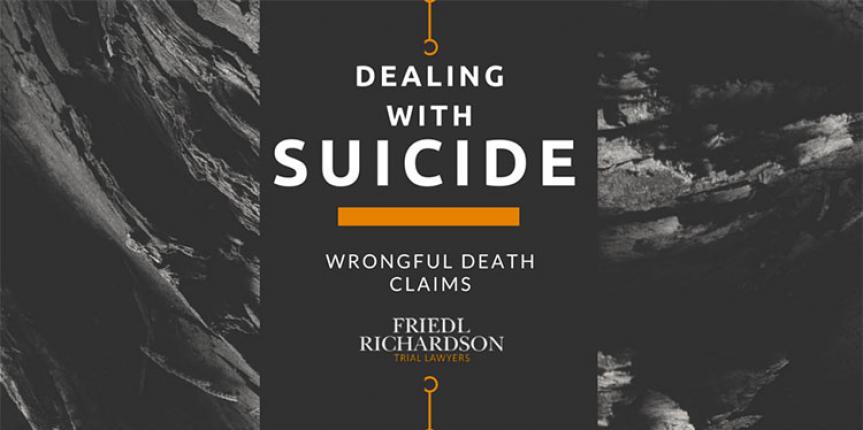Wrongful Death Claims Based on Suicide
When someone you love commits suicide, the pain of loss can be intensified by a misplaced sense of blame. Although suicide typically is the manifestation of a form of mental disorder, loved ones searching for answers may assume that the suicide was the product of an argument or event that immediately proceeded the death. A misplaced sense of guilt and need to understand the decision to commit suicide might explain this assumption, but the reasons behind a suicide can be far more complex. Some cases of suicide are actually wrongful deaths that are the result of misconduct or negligence by a medical professional or other party.
Although family members may be hesitant to explore the viability of a wrongful death lawsuit when a loved one takes his or her own life. A parent, child, spouse or administrator of the estate of a decedent may have a viable legal claim for compensation when a family member commits suicide if the negligent, reckless or intentional conduct of another person caused the suicide. However, these cases can be extremely challenging, so skilled advocacy, expert testimony and scientific evidence may be needed to establish causation and liability.
Some examples of the types of wrongful death claims that involve suicide include:
- Defective Drugs: Some medications can increase the risk of depression and suicide. A pharmaceutical company can be liable if it fails to adequately test a drug, disregards clinical studies and reports of adverse side effects, or fails to provide sufficient warnings regarding potential side effects. While the drug manufacturer may be liable for defective medications, the doctor that prescribes the drug also might be liable depending on the circumstances.
- Violent Crime Victims: When someone is violently attacked, the intense emotional impact and challenge of coping with the injuries constitutes damages that may be recovered in a personal injury action. If a distraught victim of a physical assault commits suicide, the family might have a legal claim for wrongful death against the perpetrator.
- Bullying: The increased focus on kids being subjected to intense bullying by their peers and others has spurred a number of lawsuits in cases where bullying victims commit suicide. Sometimes these lawsuits name parents of the bully, school administrators and others who are aware of the intense bullying but fail to take reasonable efforts to protect the victim.
- Sexual Abuse/Rape: The intense trauma experienced by victims of sex offenders often causes depression that can lead to suicide. Like violent assaults, the family of the victim of a sexual assault may have a legal claim for wrongful death if the sexual misconduct leads to a suicide.
- Medical Malpractice: When a medical professional fails to exercise that degree of care and skill ordinarily and customarily used by a similarly situated physician, this may be a basis for imposing financial responsibility on medical practitioners for a suicide. If the physician, psychiatrist or other medical or mental health professional fails to properly evaluate the mental state of a patient or recognize and respond appropriately to suicidal tendencies or suicidal ideation, this might justify a wrongful death lawsuit based on medical malpractice.
- Prison Inmates: Mental hospitals, county jails or prisons can be liable if they have a reason to know that someone is suicidal when in their custody and control, but they fail to take adequate precautions.
If you have lost a loved one to suicide, we encourage you to talk to an experienced wrongful death attorney. Finding a representative for such a tragedy can help with the coping and hold those responsible accountable.






